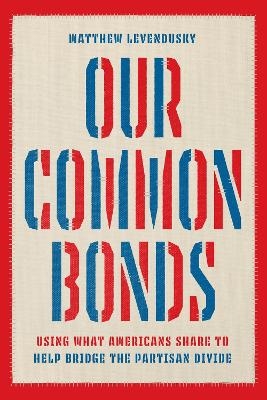
Our Common Bonds
Using What Americans Share to Help Bridge the Partisan Divide
Seiten
2023
University of Chicago Press (Verlag)
978-0-226-82470-3 (ISBN)
University of Chicago Press (Verlag)
978-0-226-82470-3 (ISBN)
A compelling exploration of concrete strategies to reduce partisan animosity by building on what Democrats and Republicans have in common.
One of the defining features of twenty-first-century American politics is the rise of affective polarization: Americans increasingly not only disagree with those from the other party but distrust and dislike them as well. This has toxic downstream consequences for both politics and social relationships. Is there any solution?
Our Common Bonds shows that—although there is no silver bullet that will eradicate partisan animosity—there are concrete interventions that can reduce it. Matthew Levendusky argues that partisan animosity stems in part from partisans’ misperceptions of one another. Democrats and Republicans think they have nothing in common, but this is not true. Drawing on survey and experimental evidence, the book shows that it is possible to help partisans reframe the lens through which they evaluate the out-party by priming commonalities—specifically, shared identities outside of politics, cross-party friendships, and common issue positions and values identified through civil cross-party dialogue. Doing so lessons partisan animosity, and it can even reduce ideological polarization. The book discusses what these findings mean for real-world efforts to bridge the partisan divide.
One of the defining features of twenty-first-century American politics is the rise of affective polarization: Americans increasingly not only disagree with those from the other party but distrust and dislike them as well. This has toxic downstream consequences for both politics and social relationships. Is there any solution?
Our Common Bonds shows that—although there is no silver bullet that will eradicate partisan animosity—there are concrete interventions that can reduce it. Matthew Levendusky argues that partisan animosity stems in part from partisans’ misperceptions of one another. Democrats and Republicans think they have nothing in common, but this is not true. Drawing on survey and experimental evidence, the book shows that it is possible to help partisans reframe the lens through which they evaluate the out-party by priming commonalities—specifically, shared identities outside of politics, cross-party friendships, and common issue positions and values identified through civil cross-party dialogue. Doing so lessons partisan animosity, and it can even reduce ideological polarization. The book discusses what these findings mean for real-world efforts to bridge the partisan divide.
Matthew Levendusky is professor of political science at the University of Pennsylvania, where he also holds the Stephen and Mary Baran Chair in the Institutions of Democracy at the Annenberg Public Policy Center. His books include The Partisan Sort and How Partisan Media Polarize America. He is also the coauthor of We Need to Talk and Democracy Amid Crises.
| Erscheinungsdatum | 08.02.2023 |
|---|---|
| Reihe/Serie | Chicago Studies in American Politics |
| Zusatzinfo | 27 line drawings, 18 tables |
| Sprache | englisch |
| Maße | 152 x 229 mm |
| Gewicht | 313 g |
| Themenwelt | Sozialwissenschaften ► Politik / Verwaltung ► Politische Systeme |
| Sozialwissenschaften ► Politik / Verwaltung ► Politische Theorie | |
| ISBN-10 | 0-226-82470-5 / 0226824705 |
| ISBN-13 | 978-0-226-82470-3 / 9780226824703 |
| Zustand | Neuware |
| Haben Sie eine Frage zum Produkt? |
Mehr entdecken
aus dem Bereich
aus dem Bereich
über Alltagsorte des sozialen Zusammenhalts
Buch | Softcover (2024)
transcript (Verlag)
24,00 €


